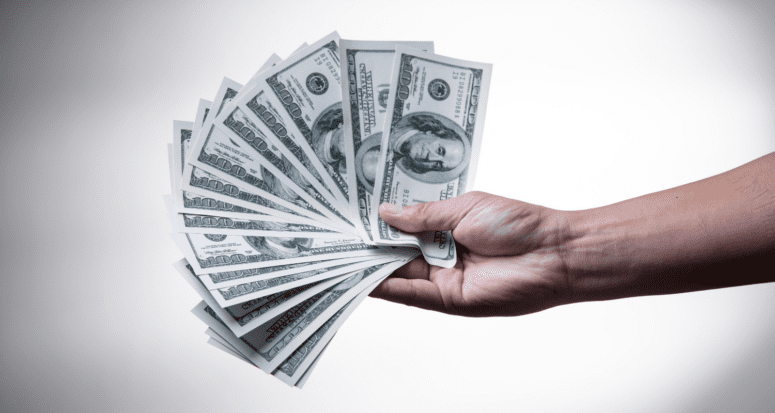Wondering How to Save For a House While Renting? Use These Tips!
- Published on
- 5 min read
-
 Evette Zalvino Contributing AuthorClose
Evette Zalvino Contributing AuthorClose Evette Zalvino Contributing Author
Evette Zalvino Contributing AuthorEvette is just your average HGTV fan who dreams of having a home worthy of being on one of those shows. When she isn't writing for HomeLight, she's working at her local real estate office. In her downtime, you'll find her searching for the next great hiking trail in her area.
At HomeLight, our vision is a world where every real estate transaction is simple, certain, and satisfying. Therefore, we promote strict editorial integrity in each of our posts.
Playing “house” was always one of those childhood moments where we could feel like a grown-up. We could section off corners of houses (or claim a whole room as the “house”) and do adult things like clean, cook, and even have “children”! The best part is, we didn’t have to pay one cent! (Well, maybe a few pieces of candy or handing over some play money.)
If only buying a real house were that simple. Unfortunately, it’s not.
Depending on what state you live in, the median price could be as low as $108,236 for a three- bedroom, one-bathroom home in West Virginia, or as much as $636,451 for a two-bedroom, one-bathroom home in Hawaii. That’s a long way from a few pieces of candy or play money!
As expensive as buying a house is, it’s not surprising that 36.6% of households are renters. However, renters renting one-, two-, and three-bedroom units have seen an increase in rent over the past three years, and in some areas, it may be cheaper to buy than it is to rent.
There are a number of reasons why a renter would want to buy a house, but the problem many renters face is figuring out how to save for a house while renting. Many aren’t sure where to even start, let alone how much money they need to save to cover closing costs, home inspections, and so on.
If you’re struggling to save for a house while renting and aren’t sure how you can maximize your down payment, we have a few ideas that can help.

1. Save on rent
One of the first ways renters can start saving money for a house is to reduce how much you’re paying for rent. There are a few ways you can go about doing this.
Move to a smaller or cheaper place
It may sound counterintuitive because you first need to have money to move (security deposit, first month’s rent, money to actually move and turn on the utilities), but by moving to a new place, you could save hundreds of dollars each month.
Not only will you save on rent, but there are other things that could become cheaper, too. For example, you could save on your energy bill if you move into a smaller place. You could save on gas if you move closer to work. You might be able to save on water and trash if it’s included in your rent.
All those savings add up and put you that much closer to your goal!
Find a roommate
If you can’t (or don’t want to) find a different place to rent for the time being, consider finding a roommate to help share the bills.
You could ask friends and family if they need a place to stay, put out an ad in your local Facebook groups, or try Craigslist (just be cautious!!).
Consider listing on Airbnb on the weekends
If you’re in a touristy area, like a big city or near attractions, you could list your place on sites like Airbnb or VRBO.com on the weekends.
If you’re uncomfortable renting the whole house, you could put a single room up for a weekend rental instead.
2. Take care of existing debt
Jeremy Smith, a real estate agent in Austin, Texas, recommends reducing the amount of debt you have.
“Get all of your credit card bills, any car payment bills, and any other interest-bearing debt and pay off the ones that have the highest interest rate.”
You could look into debt consolidation loans, but you have to be careful which lender you go with, he says.

3. Reconsider the little luxuries in your life
We love our streaming subscriptions, food deliveries, fine wines, and self-pampering days at the salon, but realistically these activities aren’t a necessity — they’re little luxuries that make you happy.
These little luxuries, though they may look small individually, can take up a big chunk of your budget if you aren’t careful. Look at the things in your life that aren’t essential and ask yourself what things could you live without while you’re building your nest egg for your very own nest.
Entertainment
Up until the coronavirus pandemic, going out to the movies, attending concerts, and other activities were favorite pastimes for many people. In 2020, people started relying more on home entertainment to keep themselves from being bored to death.
If you’re subscribed to Hulu Plus, HBO Max, Netflix and Disney+, you’re looking at $40 to $45 each month just in steaming services! And if you have these services on top of cable television, ask yourself if one or the other could suffice.
Self-care
Do you have a gym membership? Even if you have the cheapest gym membership (Planet Fitness is just $10 for the regular membership), you could save that money by working out at home.
If it’s hard to feel motivated to work out at home, get in touch with a friend and ask if they’d like to be a workout buddy. Not only will you save money, but working out may be more fun!
Maybe you like to take a day to unwind and pamper yourself by either going to a spa or salon. While it’s nice to have your hair done regularly and have a deep tissue massage after a rough week, these services add up quickly.
Consider cutting back on how frequently you get a massage or have your roots touched up. Maybe instead of going every month, consider stretching out to every six to eight weeks.
Dining
How many times do you go out to eat or order in? If it’s more than once or twice a month, you’re missing a big savings opportunity. Even value meals at your favorite fast food chain are going to cost more than $5! A dinner for two at your run-of-the-mill dine-in restaurant can cost more than $50 if you both order a meal, two drinks, and an appetizer to share.
If you absolutely need to have a latte and a muffin in the morning, consider serving yourself at home instead of going to your favorite coffee shop, where you could spend upward of $10 (after taxes) for breakfast.
Vices
If you drink alcohol on a regular basis or smoke cigarettes, you’re not only spending a lot of money each month, but it’s also damaging your health.
In the long run, these habits could cost you thousands of dollars in medical expenses, increase your health insurance premiums, and even make getting life insurance more challenging.
Travel
Vacations are nice — who doesn’t like to get away from our everyday lives and relax?
Unfortunately, vacations aren’t cheap, and until you’ve met your down payment goals, you may want to hold off on expensive vacations.
Staycations are a fantastic way to save money and get some much needed rest and relaxation. Weekend road trips are another fun way to get away without spending thousands of dollars. At best, you could just spend a couple of hundred dollars.
4. Look for ways to save on existing must-have services
It’s rough trying to figure out where you could save some money, especially when it comes to deciding what luxuries to cut back on.
It’s equally rough trying to find ways to cut back on those must-have services and goods, though, so make sure you’re really ready to make these cuts!
Auto expenses
If you drive a car, you could save money by shopping around to find cheaper car insurance if your current insurance company doesn’t have any more affordable options.
But if you have access to public transportation, then you could use public transport as your primary way of getting around and use your car only for long distance traveling. That will save on gas and maintenance, plus your insurance company may even lower your premiums because you aren’t driving as frequently.
Banking
Look at your bank statements and see how much your bank charges in fees. Sometimes banks will charge you overdraft protection fees — all that’s happening is money is automatically taken from your savings and it’s transferred to your checking so you don’t overdraft that account.
Banks will also charge you ATM fees, and some savings accounts will even charge you if you don’t do enough transactions on the account for that particular month. Maybe switching to a credit union with no ATM fees would be a better move if that’s a service you use a lot?
Household bills
You can save money on your cable bill and cell phone bill simply by changing the plan you’re on.
Instead of having the fastest internet with all of the cable channels, look for a package with slower internet speeds and fewer channels. If you’re on an expensive cell plan with unlimited data, go to a lower plan with a smaller data plan and monitor your usage. Just remember to turn on your phone’s wifi and connect to nearby wifi when available.
Also, make it a point to remember to turn down the heat or air conditioning when you aren’t home or at night. Make sure electronics and the lights are off when you aren’t in a room. And don’t leave your chargers plugged in when they aren’t in use because they continue to use power!
Groceries
For your groceries, instead of getting name-brand products, opt for the store-brand items. They’re just as tasty for a fraction of the cost.
You may even want to consider changing where you shop. You don’t have to spend oodles of money at Whole Foods or Wegmans when ShopRite or even Aldi’s have cheaper, but still high-quality, options.

5. Have a solid savings strategy
How much do you have in your savings account? If you’re like 69% of Americans, you probably have less than $1,000 in there.
You can find high-yield savings accounts, but they aren’t truly high yielding. The largest banks in the country seem to offer the absolute lowest savings rates.
Banks like the U.S. Bank and BB&T offer a paltry 0.01% APY, while Wells Fargo, Bank of America, Chase Bank and TD Bank offer rates ranging from 0.01% to 0.65%.
We aren’t even including the fees some of these banks throw at you just to have your money sitting there! Talk about adding insult to injury. Those low interest rates aren’t going to help you save for a house, especially when you compare them to online banks with high-yield savings accounts.
Business Insider released the top banks with high-yielding savings accounts, and Varo Bank comes out on top by offering 0.81% to 2.8% APY.
“I think a savings account is about tantamount to putting money under your bed these days. The rates are so low on CDs and savings accounts that you’re almost better doing anything else but that,” Smith sums up.
Job-related savings
If you get a raise and are managing on your previous salary, take the extra money in your check and put that toward savings, too!
Another option to consider: If you’re contributing to a retirement fund, put that on pause for a little while and direct that money to your down payment savings.
You could also change your tax withholdings so that you get more money in your check, to which you can put toward your savings. Heck, if you get a tax refund, don’t spend it — save it!
6. Look for ways to earn more money
Did you know that 36% of Americans (57 million of us!) have some kind of side gig? Whether it’s driving for Uber or Lyft, delivering for Postmates or Instacart, people are finding ways to earn some extra money. If you don’t have a car, there are other side gigs you can look into.
If you’re a creative person, you can sell your crafts and artwork on online marketplaces. You can become a freelancer and offer your skills to others, be it writing, photography, graphic design, editing, or whatever else!
Thanks to the internet and smartphones, there are countless ways you can make some extra money without jumping through hoops.
Then again, if you have a lot of stuff in your house that you could part ways with, you can put them up for sale on a variety of online marketplaces, Craigslist, or Facebook. You can also have a yard sale or take your goods to a second-hand store to get some money.
Note: Just be aware, any income made through gig work is taxable, so don’t forget to set aside money for Uncle Sam.
Knowing how to save for a house while renting is important!
The biggest hurdle people struggle with is sticking to a plan once they know how to save for a house while renting. They may stay on course for a little while, but something comes along that throws you off track.
As hard as it may be to cut back on things, especially when you aren’t hyper-aware of what you’re spending, you need to keep your goal in mind. The little sacrifices you make now will be worth it once you have the money for a down payment on your dream home!
Header Image Source: (金 运 / Unsplash)
